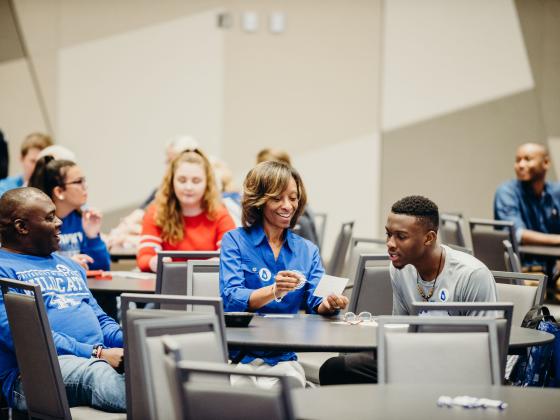Your first-year student may be experiencing:
- Academic stress as midterm approaches
- Reluctance to visit instructors or advisors
- Time management issues
- Balancing academic and social obligations
- Social stress with new friends or uncertainty caused by not finding a core group of friends
How can you help?
Continue to encourage use of academic resources, especially if midterm exams did not go as well as your student would have liked. Remind your student to meet with their academic advisor prior to spring registration, which begins at the end of the month. Suggest that your student seek out a student club or organization to become involved with. Here are some ideas for questions that may help to start the conversation.
“Where are your favorite places to eat around campus? Is your meal plan working for you?”
Make sure your student is getting out and exploring campus and Lexington. If your student needs to change a meal plan or add Flex Dollars, they can do so on the UK Dining website.
“What do you and your friends do for fun?”
You’re looking for signs of growing friendships as well as signs that your student is making responsible choices.
“Have you visited your professors during office hours?”
Too few students take advantage of this time to get to know professors and seek assistance if needed.
“How much time do you spend studying each week?”
Significantly more study time is needed in college than high school. Encourage your student to treat their schoolwork like a full-time job – at least 40 hours a week.
“How have you learned to balance your many responsibilities?”
This is an ongoing struggle for many college students, so you may hear some frustration. The key is that an attempt at achieving balance is being made. Remind your student about integrated success coaching, a free, no-stress way to learn the skills and resources to be successful in college and beyond.
“Have you made plans for your spring semester schedule yet?”
Students should have some ideas in place before meeting with advisors; myUK GPS has some useful course planning features that your student can use in preparation for their advising meeting.
“Where do you want to live next fall?”
Students need to thoughtfully consider the advantages and disadvantages of living on campus versus living off campus. The University of Kentucky strongly recommends that all first and second-year students live on campus. Our Lexington community tells us that the best tenants for rental are those who have lived on campus at least their first two years. UK Housing has several options for upper-level and graduate students, including University Flats and Boyd Hall.
